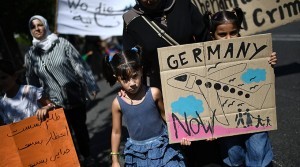European countries are preparing to start returning refugees to Greece, according to an article by British news medium The Guardian. The move was denounced by human rights groups, as Greece, which has been mired in a financial crisis for the past 7 years, has seen large numbers of refugees and illegal migrants reaching its shores in an effort to reach more prosperous European countries in the north. There have been a series of protests in relatives of refugees in Greece to reunite with family members in Germany as the asylum procedures have been extremely slow. The article is titled: “EU states begin returning refugees to Greece as German reunions slow”
From The Guardian:
In a move decried by human rights groups, EU states will send back asylum seekers who first sought refuge in Greece, despite the nation being enmeshed in its worst economic crisis in modern times.
Germany has made nearly 400 resettlement requests, according to officials in Berlin and sources in Athens’ leftist-led government. The UK, France, the Netherlands and Norway have also asked that asylum seekers be returned to Greece.
Greece’s migration minister told the Guardian the first returns were expected imminently.
“The paperwork has begun and we expect returns to begin over the next month,” said Yannis Mouzalas. “It will start with a symbolic number as an act of friendship [towards other EU nations]. Greece has already accepted so many [refugees], it has come under such pressure, that to accept more would be absurd, a joke if it weren’t such a tragedy.”
Mouzalas said he had no idea where the returnees would be placed or whether they would ever leave Greece. “I don’t know where they will go. It could be Athens, it could be Thebes … they are accommodated in an apartment scheme,” he said. “Whatever [happens], conditions will be good, they have improved greatly and will meet EU criteria.”
Officials say privately that acceptance of the transfers has been non-negotiable given Greece’s EU membership and receipt of funds from Brussels. Resettlement will not affect asylum seekers who arrived in the EU before March this year. Greece was at the centre of the 2015 migrant crisis, when close to a million men, women and children entered the country as part of onward journeys that often took them to Germany. Most were arriving from war-torn Syria.
The number of people arriving dropped dramatically when the EU reached an accord with Turkey 17 months ago to help accommodate refugees from Syria. But hundreds are still arriving each week.
Last week a reported 330 migrant arrivals were registered on Greece’s eastern Aegean isles, piling the pressure on overcrowded and vastly overstretched reception centres in Lesvos, Chios, Kos, Leros and Samos. An estimated 14,100 people are currently in limbo in accommodation centres on the Greek islands, according to figures released by the country’s interior ministry on Thursday.
Conditions in the centres are described as deplorable, and protests and riots are commonplace. Human Rights Watch recently said self-harm and suicide attempts along with aggression, anxiety and depression were all on the rise. Local services complain about being unable to cope.
more at: theguardian.com
authors: Helena Smith Philip Oltermann
Ask me anything
Explore related questions





